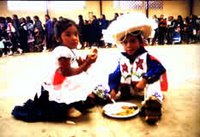
Story by : David Agren
The Purepecha -- many of whom don't speak much Spanish -- lead a tough life in rural Michoacan.
Many of the Purepecha Indians from the countryside left their small plots of land at 5:30 a.m., walking in traditional costumes under overcast skies to the annual Virgen de la Asuncion celebrations in Tingüindin, Michoacan. In earlier years they came to dance and honor the virgin. But for the past 35 years, the efforts of a Guadalajara family with roots in the pueblo have made the event all the more special.
Since the early 70s, Luisa Noriega's family has sponsored a breakfast on the first Sunday in August, bringing, at least for one weekend, a ray of hope into the lives of the impoverished residents.
Family members served more than 850 breakfasts of birria (a spicy goat stew), beans, rice, tortillas and tamarind-flavored atole (a hot cornmeal drink) in the community hall. Later, they passed out 300 despensas (handouts) of beans, rice, tuna, paper products and cooking oil to Purepecha women, who patiently lined up, while an out-of town-salesman hawked a miracle cure for everything, using a loudspeaker atop his beat-up van. Their children each received a toy.
The Purepecha -- many of whom don't speak much Spanish -- lead a tough life in rural Michoacan. Most work for low wages picking avocados and live in one-room homes. Few of the children advance beyond elementary school, instead going to work with their parents in the campo (countryside). With few opportunities available, migration to the United States is common.
At first glance, Tingüindin looks like most of the pueblos lining the winding road south from Zamora. On a typical Sunday morning, women in traditional robes, carrying purchases from the many tianguis (informal markets), walk along the highway, past vendors selling in-season fruit -- mostly pears at this time of year -- from tiny stalls.
Tingüindin's notoriety comes from its impressive triple bell tower at the Santuario Virgen de la Asuncion. According to Noriega, the town's name comes from the Purepecha words tin, güin and din, pueblo of the bells. Additionally, like many Michoacan towns, it also has its claim to fame: traditional bread, which is both sweet and baked in triangular pans.
Noriega's grandmother grew up in nearby Cotija, before moving to Tingüindin during the Cristero rebellion. After moving to Guadalajara, she and her husband would vacation in the town, taking in the celebrations. Dismayed by the nearby poverty -- Luisa's mother said many in the indigenous population barely survived on a diet of only tortillas with salt and chile -- they wanted to give something back to the community.
The idea for a breakfast came while Luisa's grandfather Jose de Jesus Jimenez was eating a bowl of menudo (a rich soup made with tripe) at a puesto (stall). Many children begged for 20 centavos, enough for a cup of menudo broth.
Jimenez later arranged for the señora running the puesto to make menudo for the inaugural breakfast the following year.
Jimenez passed away in the late 1980s, but his children and grandchildren kept the tradition going. Over the years, it's become an integral part of the two-week celebration.
During the fiesta, Purepechas of all ages perform the traditional dance of the veijos on the rustic street in front of the cathedral and in the community hall, while the locals waited in line for their breakfast. The men wear pale wooden masks and white pants brandishing images of the virgin -- along with Christ and other significant figures. The women stitch intricate shawls, featuring floral patterns or sometimes, products of the region like fruit. A brass band accompanies the dancers.
The grateful recipients repaid the favor with gifts of membrillo (quince), an apple-like fruit full of seeds, and peaches they picked in the countryside.
By the mid afternoon, the Purepechas headed for home. They had a long walk ahead of them.
From the Guadalajara Colony Reporter.


No comments:
Post a Comment